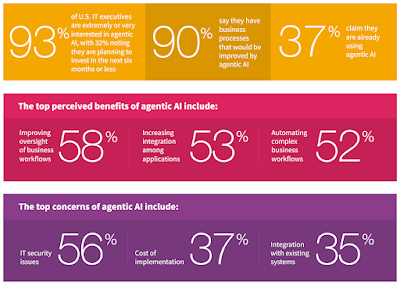 |
| Source: UiPath 2025 Agentic AI Report. Key findings from the research, including attitudes to agentic AI; benefits, and concerns. |
UiPath, an enterprise automation and AI software company, has found that 90% of IT executives in the US have business processes that would be improved by agentic AI, while 77% state they are prepared to invest in agentic AI this year.
An AI agent is a software entity that uses AI techniques to perceive its environment, process information, and take actions to achieve specific goals or objectives. AI agents can operate autonomously or semi-autonomously and are designed to mimic human decision-making or problem-solving processes in a given domain.
The UiPath 2025 Agentic AI Report* also found that 37% of respondents say they are already using agentic AI, and 93% are either extremely or very interested in exploring it. And while most IT leaders have seen value from their automation and AI deployments to date, they have also experienced challenges – namely, security, development complexity, integration, and data quality.
When asked which benefits of agentic AI would be most appealing to their businesses, respondents cited improved oversight of business workflows (58%), increased integration among applications (53%), and the automation of complex business workflows (52%). According to the report, the top limitation with existing AI tools is lack of integration with other business applications, with 87% stating that interoperability between different AI technologies is essential or significant to their organisations.
“Agentic AI is a transformative approach that greatly expands and enhances the ability to automate larger, more complex business processes. For agentic AI to have meaningful impact, organisations need to provide agents with the needed foundation to intelligently plan and synchronise actions across robots, agents, people, and systems, all within enterprise-grade governance and security. The most powerful use cases for agents will be those that can orchestrate across business systems,” said Daniel Dines, CEO and Founder of UiPath.
Businesses continue to face substantial challenges in driving AI transformation, especially when dealing with complex workflows across multiple systems. Many have yet to see the promised productivity gains materialise and don’t trust AI in their most critical enterprise processes.
In fact, respondents identified IT security issues (56%) and integration with existing systems (35%) as their top concerns with agentic AI, along with cost of implementation (37%). When asked what capabilities would be most critical to effective implementation of agentic AI workflows, the top-ranked response was to “safety and privacy”, followed by “seamless integration with existing systems”. Executives see business value from agentic technology that can operate autonomously, so long as it is governed, secure, and trustworthy, the report found.
To address the safety, privacy, ethical, and regulatory concerns that IT leaders have with agents, automation-enabled orchestration will be essential, UiPath said. “As AI systems become more autonomous, enterprises must strike a balance between autonomy and human oversight to prevent unintended consequences and guarantee that AI-driven actions align with ethical, compliance, and legal standards. A new era of agentic automation is going to address the challenges with orchestration, governance, and value derived from agentic AI,” said Dines.
Tomur Ho, Director, Sales Engineering, South Asia, UiPath noted that interest is high in agentic AI in the Asia Pacific region (APAC): “In Asia Pacific, we are seeing an accelerated push towards agentic AI transformation, as businesses look to AI agents to automate complex business workflows and unlock new levels of productivity. While organisations see its potential, success with agentic AI will require robots, agents, people and models to work seamlessly together to enable autonomous processes and smarter decision-making.
"The focus for APAC organisations now is on building a secure foundation for its adoption, ensuring effective orchestration of systems and processes, to enable AI agents to drive new levels of efficiency and innovation.”
Explore
Download the UiPath 2025 Agentic AI Report at https://www.uipath.com/resources/automation-analyst-reports/agentic-ai-research-report
*The report describes a research project in which 252 US IT executives were surveyed in October 2024. They all worked at companies above US$1 B in revenue and had roles as VPs and directors of IT, and 100% said they were familiar with AI and automation. The report is also based on interviews with eight IT and AI leaders who were particularly familiar with these topics to learn more about their thinking about agentic AI.
No comments:
Post a Comment